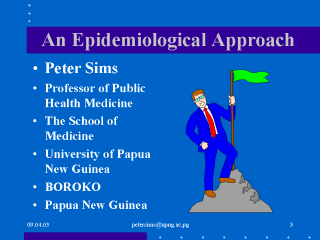| front |1 |2 |3 |4 |5 |6 |7 |8 |9 |10 |11 |12 |13 |14 |15 |16 |17 |18 |19 |review |
 |
This presentation attempts to
look at the wider issues but also to examine the problem in Papua New Guinea - a
developing country in the midst of a demographic and social transition. The country was undeveloped until the 20th century, in the 1930’s one million people were discovered living in the inaccessible highlands and living a “stone-age” life. The missionaries began in the 19th century and the country has been largely christian for 70 years - perhaps 3-4 generations. The second world war and bitter fighting between Australians and Japanese culminated in Australian colonisation and in 1975 with PNG Independence. The country remains inaccessible by road; there are huge problems in providing services to the rural poor - health, education, welfare. There are real problems of law and order, tribal fighting continues and an electoral democracy is perilous. The country is poor, there are minimal exports, mining and forestry has plundered the reserves, much food is imported. Malnutrition is all too common - 43% of under fives are stunted and malnourished. Yet in the capital, Port Moresby there are the adjuncts of civilsation, conspicuous wealth, a University………. the computer and the internet. There are major problems with crime and corruption. In such a time of change old traditions and new ideas jostle. The role of women is changing - there is a real chance of choice and change. |